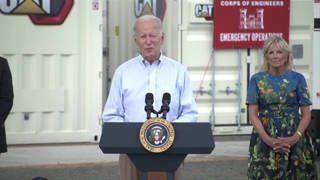
Democracy Now! co-host Juan González says people are showing resilience in the face of Hurricane Fiona in his native Puerto Rico, where the power grid crashed across the entire island due to the storm. Many who learned from 2017’s Hurricane Maria are dipping into their personal water reserves and using power generators, he says. “Puerto Rican people … have actually been able to recognize the fact that the government, when it comes to these crises, is inept, and many people have been able to develop their own ability to survive,” says González.
Transcript
AMY GOODMAN: Juan, I just wanted to ask you first about the crisis in Puerto Rico, where most of the island remains without power for another day, after being hit by Hurricane Fiona. In fact, the electricity went out before Fiona hit. You were born in Puerto Rico. You know, to say the least, you are closely tied. You still have family in Puerto Rico. What are you hearing?
JUAN GONZÁLEZ: Well, Amy, I’m hearing pretty much what the news accounts have said. I’ve also been in contact with my sister, who’s in Cayey in Puerto Rico. Clearly, the electricity is out once again, and water, potable water, to most of the island residents is out once again.
And unfortunately, the reality is that the Puerto Rican people, since Hurricane Maria, have actually been — been able to recognize the fact that the government, when it comes to these crises, is inept, and many people have been able to develop their own ability to survive. Increasingly, more and more Puerto Rican households, when they can afford it, have generators of their own, to have emergency supplies, and, as I was speaking with my sister yesterday and today, they’ve also been able to sometimes have their own water reserves. And my sister has a 600-gallon water tank, basically for emergencies like this.
So, unfortunately, the billions of dollars the United States spent to reconstruct the infrastructure of Puerto Rico after Hurricane Maria is not as resilient and is not as — the money is not as well spent. And so we’re once again faced with the fact that — who knows how long it will take for electricity and potable water to be accessible again to the people of Puerto Rico? And here we are six years into the financial control board, that was only supposed to be in power for five years — it’s already one year over its original time allotment by Congress — and we’re still in a situation where Puerto Rico, as a result of its colonial condition, is not ready to deal with crises of this type.
AMY GOODMAN: Well, I want to thank you, Juan. And, of course, we’ll continue to cover what’s happening in Puerto Rico. Now the storm is hitting Turks and Caicos, went through the Dominican Republic. We will cover that, Alaska, Japan, the typhoons there and this whole issue of the climate catastrophe. This week is Climate Week here in New York City, and we’ll be bringing guests throughout the week talking about this critical issue of our day.
Coming up, we’re going to look at President Biden’s announcement that the COVID pandemic is over. We’ll speak with Steven Thrasher, the author of The Viral Underclass: The Human Toll When Inequality and Disease Collide. More than 400 Americans a day are still dying of COVID. Stay with us.













Media Options